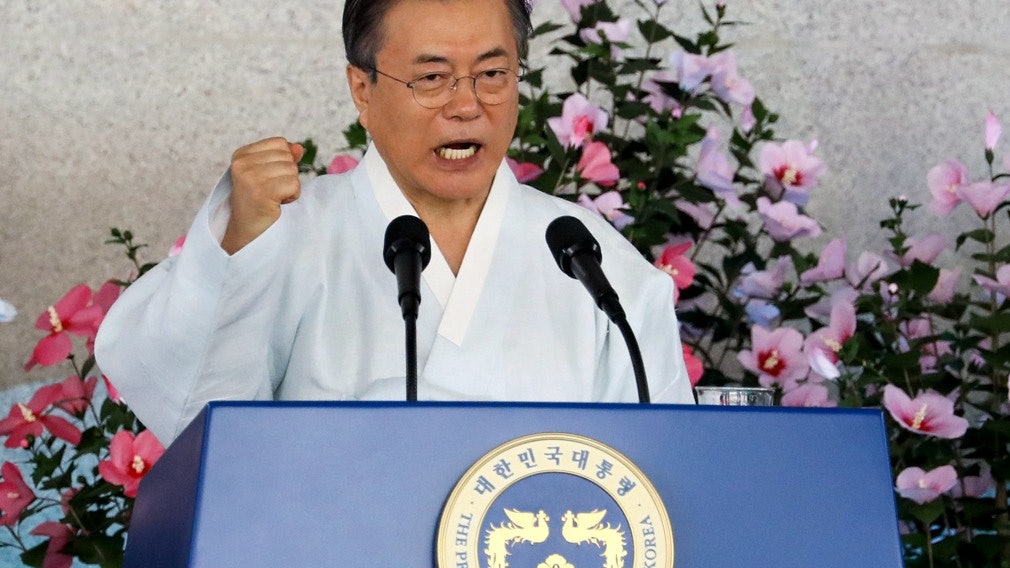Since Japan’s export controls on Korean semiconductor manufacturing materials, friction between the two countries has continued to heat up. South Korea decided on August 22 to cancel the Military Intelligence Protection Agreement between the two countries.
Yonhap News reported on August 22 local time that the first national security room of the Qingwatai National Security Agency in South Korea said on the 22nd that the government decided not to renew the Korean-Japanese Military Intelligence Protection Agreement (GSOMIA).
Jin Yougen said that the Japanese government will be notified through diplomatic channels within the time limit for renewal according to the agreement.
Zheng Yirong, head of the National Security Office of Qingwatai, South Korea, hosted a meeting of the Standing Committee of the National Security Conference (NSC) on the afternoon of the 22nd to discuss whether to renew the Agreement on Military Intelligence Protection.
The Korea-Japan Military Intelligence Protection Agreement will expire on August 24, and if neither party raises an objection, the agreement will be automatically extended for one year. South Korea’s cancellation of the agreement is bound to further escalate the friction between South Korea and Japan.
South Korean Foreign Minister Kang Jing and the South Korean government decided on the 22nd that they would not renew the Korean-Japanese “Military Intelligence Protection Agreement”. This is a decision made by the government due to the issue of South Korea-Japan trust, and has nothing to do with the South Korea-US alliance.
Kang Jinghe stressed that the decision was attributed to the lack of trust in Korea and Japan, and the government will clarify this position to the United States and Japan. She believes that the ROK has explained the decision to the US and Japan to a certain extent, but it still needs to follow the formal notification procedure.
According to the Japanese Kyodo News on the 22nd, Japanese government sources expressed dissatisfaction on the 22nd that South Korea decided to abandon the “Military Intelligence Protection Agreement” (GSOMIA) and said it was “extremely regrettable.”
Since Japan announced the export control of Korean semiconductor manufacturing raw materials in early July, the trade friction between Korea and Japan has been escalating. On August 2, Japan announced that it would remove South Korea from the “white list” of security export management preferential countries. In response, on August 12, the South Korean government also decided to remove Japan from the “white list” of exporting preferential countries. The relationship between South Korea and Japan is in the worst period since the normalization of diplomatic relations in 1965, and is spreading from the economic and trade field to the security field.
As a bargaining chip for Japan’s “economic revenge,” South Korea’s recent call for abolition of the military agreement is soaring. The analysis believes that since this agreement is related to the military cooperation between the United States, Japan and South Korea, if the agreement is terminated, it will definitely affect the US-Japan-ROK alliance.
The Korea-Japan Military Intelligence Protection Agreement was signed into force on November 23, 2016. The agreement stipulates that both Korea and Japan can exchange military intelligence and have confidentiality obligations for information. The agreement is for one year and will be automatically extended upon expiration. If one party is unwilling to renew the contract, the agreement will be terminated 90 days in advance, that is, before August 24.
After the Korean-Japanese trade dispute was fermented, the South Korean presidential palace, Cheong Wa Dae and the Ministry of National Defense, successively stated that they would re-examine the Korea-Japan Military Intelligence Protection Agreement.
In fact, in the process of signing the “Military Intelligence Protection Agreement,” Japan has always been very active, and South Korea has been hesitant. On the one hand, South Korea’s intelligence needs for Japan are not strong; on the other hand, due to historical reasons and actual conflicts, the Korean-Japanese military cooperation has a strong opposition in Korea. It is for this reason that in June 2012, the Lee Myung-bak government was forced to announce the abandonment of the agreement with Japan at the last minute. The reason why Park Geun-hye’s government was able to sign an agreement with Japan in less than a month was largely due to various factors such as the North Korean nuclear test, the Korean internal affairs and the US urging, but the agreement could not cover the history between Japan and South Korea. Problems and real disputes.
Since the signing of the agreement, there have been 22 pieces of information exchanged between the two countries according to the agreement, including one in 2016, 19 in 2017, and two in 2018. It is not difficult to see from the above data that in addition to the frequent nuclear activities of North Korea in 2017, there was little information exchange between Korea and Japan in other periods. This is obviously affected by the changes in relations between the DPRK and the ROK and the DPRK and the United States, and objectively lowered the agreement for South Korea’s own security. The importance of demand.












